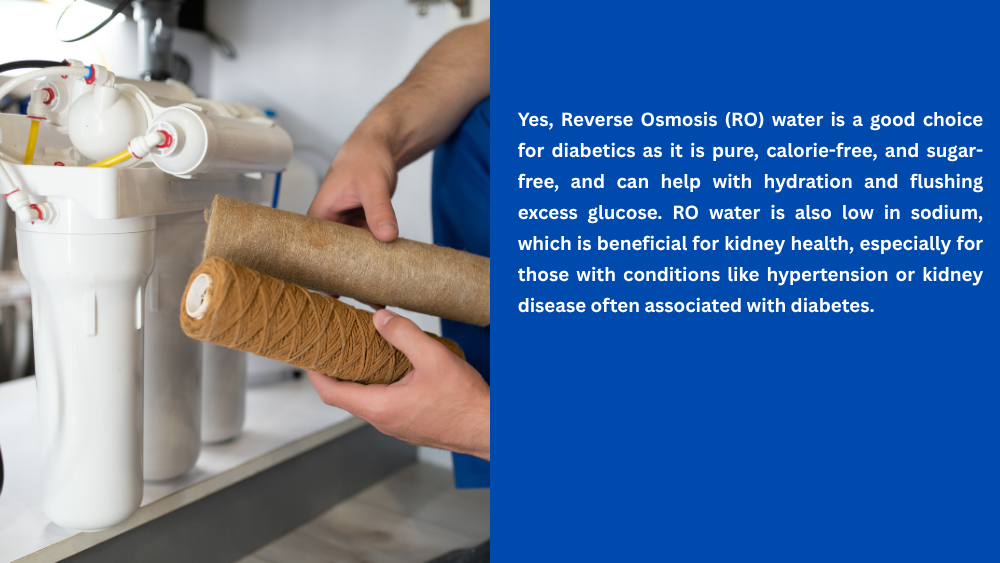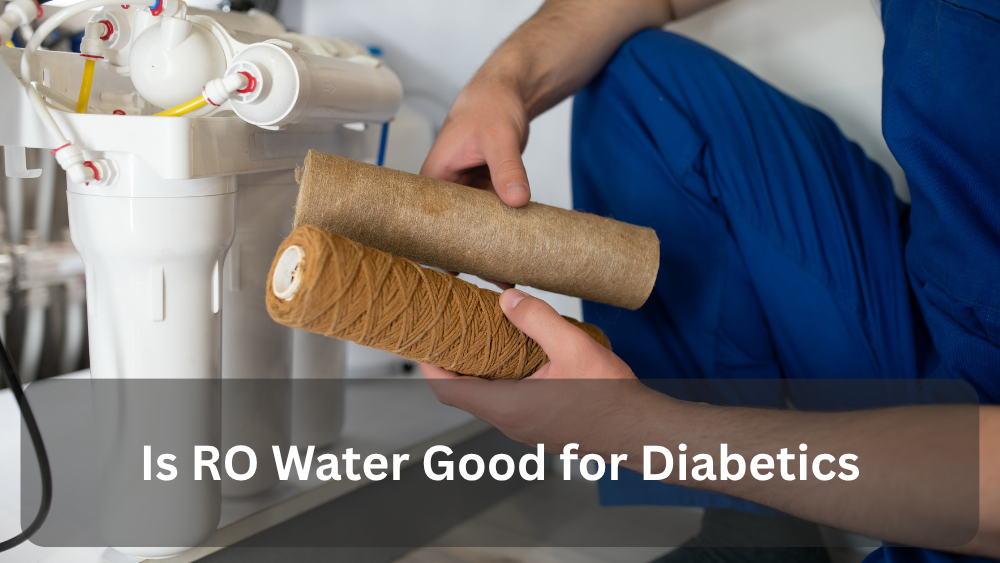For people living with diabetes, hydration plays a vital role in maintaining stable blood sugar levels and overall health. The kind of water you drink affects how your body manages glucose, insulin efficiency, and mineral balance. Many households today use reverse osmosis (RO) systems to purify water, but a common question arises — is RO water good for diabetics?
The short answer is yes, RO water is generally safe and beneficial for diabetics, provided it is properly remineralized or balanced. It removes harmful impurities, heavy metals, and excess salts that can strain the kidneys — organs already vulnerable to diabetic complications. However, drinking pure demineralized RO water long-term without replenishing essential minerals like calcium and magnesium may not be ideal.
Key Takeaways
- RO water is safe and healthy for diabetics when properly remineralized.
- It helps reduce exposure to heavy metals and chemicals that worsen kidney health.
- Long-term consumption of unmineralized RO water can lead to mild electrolyte imbalance.
- Adding an alkaline or mineral filter improves RO water quality for diabetics.
- Always ensure regular RO maintenance to keep TDS levels between 80–150 ppm for balanced hydration.
Why Water Quality Matters for Diabetics
People with diabetes need optimal hydration to regulate blood sugar and prevent complications like dehydration, neuropathy, and kidney strain. Water helps the body flush excess glucose through urine and supports proper metabolism.
Contaminated or hard water can contain nitrates, lead, or heavy metals that further stress the kidneys. Since diabetics are more prone to nephropathy, water purity becomes essential. RO systems offer an advantage here by removing 95–99% of these toxins, ensuring safer hydration every day.
To understand how RO purifiers remove toxins, see how RO systems remove arsenic from drinking water.
How Reverse Osmosis Water Benefits Diabetics
RO systems purify water through a semi-permeable membrane that filters out dissolved salts, heavy metals, and harmful chemicals. This results in soft, clean, and low-TDS water that’s gentle on the kidneys — especially beneficial for diabetic patients.
Here are some specific advantages:
- Kidney protection: RO water reduces sodium and chloride intake, helping diabetic kidneys function better.
- Improved glucose metabolism: Staying hydrated with pure water helps insulin transport glucose more efficiently.
- Reduced exposure to contaminants: Removes lead, arsenic, and mercury that can increase oxidative stress.
- Better taste and digestion: Soft, low-TDS water supports smoother metabolism and gut comfort.
For more insight into the removal of heavy metals, read does reverse osmosis remove heavy metals.
Potential Concerns for Diabetics Drinking RO Water
While RO systems produce very pure water, they also remove beneficial minerals such as calcium, magnesium, and potassium. For most healthy individuals this has minimal impact, but diabetics may experience slight changes in mineral balance over long-term use.
Low mineral intake can:
- Affect nerve and muscle function.
- Reduce insulin sensitivity in rare cases.
- Alter electrolyte balance, especially if diet is poor.
To offset this, many people add an alkaline or remineralization filter. For options, explore best alkaline filter for RO.
Comparing RO Water with Other Drinking Water Types
| Water Type | Safety for Diabetics | Notes |
|---|---|---|
| RO Water | Very Safe (if remineralized) | Removes toxins; may need mineral filter |
| Tap Water | Risky | May contain lead, chlorine, and pathogens |
| Bottled Water | Safe | Quality varies; check TDS and source |
| Distilled Water | Safe short term | Completely demineralized; not ideal long term |
| Mineral Water | Excellent | Contains beneficial minerals but costlier |
As the table shows, RO and mineral water are the safest choices for diabetics, especially when the RO system is well maintained.

Impact of Minerals and pH for Diabetic Health
Diabetics benefit from slightly alkaline water (pH 7.5–8.5) because it helps neutralize acidity caused by high glucose levels. Pure RO water tends to be slightly acidic (pH 6.0–6.5) since minerals are stripped away. Using an alkaline post-filter can restore the pH to healthy levels.
Maintaining TDS between 80–150 ppm also ensures water tastes natural and contains trace minerals for nerve and muscle function. To test water quality at home, see what is TDS in water and why should you measure it.
What Experts Say
Medical professionals agree that RO water is safer for diabetics than untreated tap water. The World Health Organization (WHO) notes that while demineralized water lacks minerals, it is not harmful if the diet provides adequate nutrition (WHO.int).
The Centers for Disease Control and Prevention (CDC) also emphasize the importance of avoiding heavy metals and chemical contaminants, which are efficiently removed by RO systems (CDC.gov).
Nutritionists often recommend adding lemon or electrolyte drops to RO water to maintain a natural mineral balance.
Daily Hydration Tips for Diabetics
- Drink gradually throughout the day instead of all at once.
- Use remineralized RO water for the best combination of purity and balance.
- Avoid sugary drinks or artificially flavored water.
- Check your urine color — light yellow indicates proper hydration.
- Clean RO filters regularly to maintain purity and taste.
Long-Term Use and Kidney Health
Chronic dehydration increases blood glucose concentration and strains diabetic kidneys. Because RO water is softer and lower in sodium, it helps prevent kidney stone formation and reduces filtration pressure on glomeruli.
For best results, diabetics should combine RO water with a balanced diet rich in magnesium and potassium. You can also read is RO water really safe for daily drinking for more guidance.
Environmental and Maintenance Considerations
While RO systems purify water effectively, they do waste some water during filtration. To reuse that reject water safely, see how to reuse waste water.
Keep your RO filters clean and replace membranes every 18–24 months. Regular maintenance prevents bacterial buildup and ensures consistent TDS levels. For step-by-step cleaning advice, check how to clean and sanitize an RO system.
Key Points Recap
- RO water is safe and suitable for diabetics, especially when remineralized.
- It removes contaminants that damage diabetic kidneys and nerves.
- Maintain water TDS around 100 ppm and pH between 7.5–8.5 for ideal results.
- Regular filter maintenance ensures consistent purity and safety.
- Pair RO water with a balanced diet to restore lost minerals naturally.
FAQs
1. Can diabetics drink RO water every day?
Yes, diabetics can drink RO water daily. It’s safe, pure, and kidney-friendly, especially when remineralized to maintain electrolyte balance.
2. Is pure RO water bad for diabetics?
Not necessarily. However, long-term use of completely demineralized water without dietary minerals can affect mineral balance. Adding a post-filter helps.
3. Does RO water affect blood sugar levels?
No. RO water has no calories or carbohydrates and does not influence glucose levels. Staying hydrated with clean water supports healthy metabolism.
4. Should diabetics drink alkaline RO water?
Yes, slightly alkaline water (pH 7.5–8.5) can help balance acidity and improve hydration, which benefits blood sugar stability.
5. What is the ideal TDS of RO water for diabetics?
A TDS between 80–150 ppm is best. This range ensures clean yet mineral-balanced water suitable for diabetic health.
Conclusion
Reverse osmosis water is one of the safest and most beneficial drinking options for diabetics. It eliminates harmful contaminants, protects kidney function, and supports glucose balance when consumed as part of a healthy lifestyle. While unmineralized RO water is not harmful, adding an alkaline or remineralization stage ensures that diabetics receive optimal hydration without losing essential minerals.
By maintaining proper pH and TDS levels, RO water becomes an excellent choice for daily consumption — helping diabetics stay hydrated, reduce toxin exposure, and promote long-term well-being.

Hasan Al Sarker is a Reverse Osmosis Specialist. He has worked for many years to ensure safe drinking water for all. His research paper has been published in several journals, including Issue, Medium, and Slideshare. He is recognized as a water doctor among specialists though he did not attend medical college.
Besides working as a researcher of reverse osmosis technology, he is also very fancy with the kitchen and cooking. His guides are reading thousands of people every day. As a head of content, he is responsible for all the published articles at RO System Reviews.

